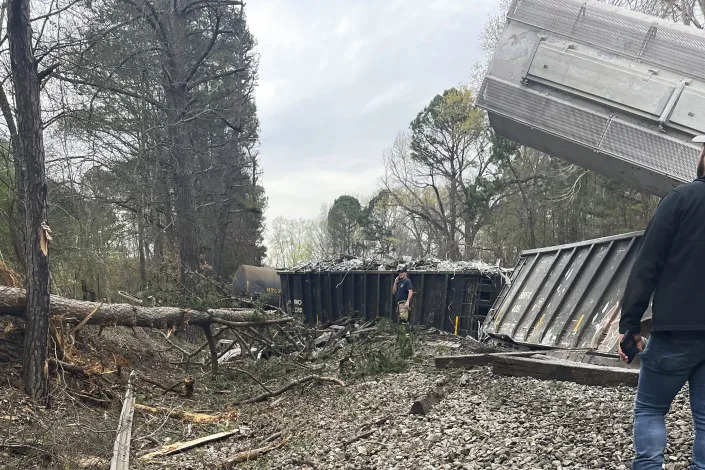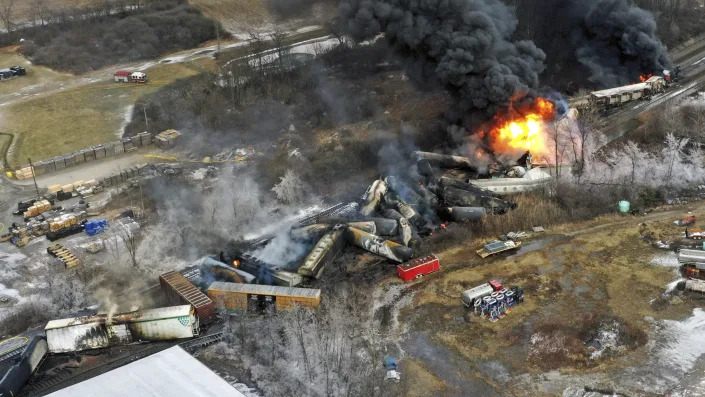Thu, March 9, 2023
Northwestern University Professor Emeritus of Civil & Environmental Engineering Joseph L Schofer joins Yahoo Finance Live to discuss the Ohio train derailment, railroad regulation, employment struggles across the railroad space, and the outlook for Norfolk Southern.

Video Transcript
- Norfolk Southern's CEO is facing the US Senate Committee on Environment and Public Work amid scrutiny over last month's train derailment in East Palestine, Ohio. Will the turmoil of recent events be enough to alter the trajectory for US rail infrastructure? Here to discuss is Joseph Schofer. He's a Northwestern University professor emeritus of civil and environmental engineering.
Thank you for being here. So I know that's a big question to kick it off. But I guess first I would ask whether you think there need to be fundamental changes in rail infrastructure. Was this some sort of wakeup call for the industry, Joseph?
JOSEPH SCHOFER: I think it's a wakeup call. I mean, this is a real disaster. On the other hand, keep in mind that no one was killed. It doesn't look like the environmental consequences are all that serious.
And my concern going forward is, what are the causes? What's fundamental here, and what should motivate changes? As I watch the news coverage, it looks like every politician, from the local level to the federal level, is trying to jump in front of the camera and say, I'm gonna save your lives. But we really don't have a good sense of the scope of the problem and whether what we're seeing, particularly the several events in Ohio, are in any way connected. My sense is they're not connected.
The railroad industry has a motivation to take care of its infrastructure because its livelihood depends on that infrastructure. And they have a variety of strategies for doing that. Can they do better? I'm certain that they can do better. I'm certain that there are opportunities for better use of technology, more investment in safety and in the workforce.
But right now, they tend, particularly the class I railroads, the largest railroads in the nation, are very much driven by you, by Wall Street, and by the pressures to keep their operating ratios low, which means to make a bigger profit. And there needs to be some balance in that. I think that this incident is getting people's attention.
- Joseph, Ines here. And so what do you think should this investigation look like? I mean, what are some of the questions that need to be asked to get to the bottom of what happened and whether or not it was preventable?
JOSEPH SCHOFER: I think it's very straightforward. I think it's a matter of answering the question, what was the cause, or what were the precipitating causes? I don't think we have a full answer. I know we have a partial answer on the Palestine event, but not yet on the other events.
My concern is acting too soon, that is, everyone trying to jump in and saying, I'm gonna solve this problem, when I don't really quite know what the problem is. It looks like there may be an opportunity to add some detection capability to detect overheated bearings or other kinds of anomalies in the rail system. But my guess is, based on looking at long-term trends in derailments in particular, and railroad accidents in general, is that I don't really see a crisis here.
I see a need to respond to this and to make sure this doesn't happen. And in the long run, I think the railroads need to rethink their workforce strategy, that is, to assure that they have a sufficient number of employees. And that's a problem because they've tried, but they haven't had great success in recruitment.
And part of that is these are difficult jobs. And while they pay well, they're difficult, and they're dangerous, and the working conditions need to be adapted to attract a 21st-century workforce.
- Well, and to that point, of course, the railroads have been fighting with their unions, right, over the past six months or so. Among other things, the folks who work for the railroads want more flexible sick leave policies, et cetera. Is that at odds with the push that we've also seen from the railroads over the past few years for efficiency, right, for--
JOSEPH SCHOFER: Yes.
- --you know, so how--
JOSEPH SCHOFER: It is at odds.
- How is that gonna resolve?
JOSEPH SCHOFER: Well, it's gonna resolve because this is a typical labor-management conflict. And it has to resolve because the railroads need the workers to function. They're moving more toward automation. And I think that's probably, in the long run, inevitable and probably a good thing.
But there needs to-- each party in this dispute needs to find a compromise. The working conditions are a challenge. And some of the railroads are trying, are experimenting and trying to do better.
I think people that are looking at the industry from the outside, including me, are saying, yeah, you guys you can do better. These working conditions are not good. You can look at what other people have done in the logistics industry. There are examples of developing a better balance and treating employees better.
The stories that I'm hearing from the railroads is that they're desperately trying to hire, and they're not finding the people that are willing to accept the jobs under the current conditions. So current conditions have to change.
- We've also seen some consolidation and attempted consolidation, of course, within the railroad industry. Does that also contribute to potential safety issues? Or do you think that, you know, when you have integration, it can go smoothly and not risk those kinds of things?
JOSEPH SCHOFER: Well, I'm not sure I'm not sure what you mean by consolidation. I mean, you've got the major merger in place-- on the table right now. And my sense is that's likely to go through. And the expectation is that this is the last merger you're gonna see for the foreseeable future.
So I don't see so much consolidation. But I do see a matter of finding a different balance. And consolidation doesn't seem to me to be a huge threat in the sense that the industry has an incentive to be safe.
And mistakes were made. You have this event in East Palestine. It isn't really clear to me that a mistake was made. It looks like the employees on the train-- and there were three operators on the train-- they did the right thing. Maybe they didn't have the right information. And so that's a technological problem that we can solve.
But I guess I don't see a long-term threat here. One of the things you have to keep in mind is if you didn't have, whatever it was, 330 or 350,000 gallons' worth of hazardous materials on that train, how would they have moved? They would have moved in 30 trucks. Would they have been safer? And the evidence is no, they wouldn't have been safer.
- And speaking of hazardous materials, do you see more regulations coming down the line when it comes to transporting hazardous materials via rail?
JOSEPH SCHOFER: It's possible, but I seriously doubt it. I mean, again, my sense is let's try to understand what the causal factors here were and address those causal factors. So I would not jump right away to regulation. It doesn't say that it's gonna happen. But I don't see that as an immediate answer.
Probably, if there's a change in operations and strategy and in regulations, it may be in detecting events as they proceed, that is, to catch this before it happens. But I don't think it's a matter of pulling hazardous materials out of the railroads. One of the things to keep in mind is that railroads have an obligation to serve. They have a common carrier obligation. And within broad limits, they're not in a position to say, no, I won't carry your goods. Their business is to keep the economy going.
So the question is, how do you find a way to assure that? They're motivated to do it. Norfolk Southern is gonna pay a price for this, at least, certainly, a public relations price, if not a monetary price as well. The whole industry will learn from this. Going to more automated detection, yeah, probably a really good idea-- feasible, cost, money, that's fine. It's worth it.
- All right. We'll see what happens. Joseph Schofer, thank you so much for your time this morning. We appreciate it.
Railroad group warns that car flaw could cause derailments

- This photo taken with a drone shows portions of a Norfolk Southern freight train that derailed Feb. 3, in East Palestine, Ohio, are still on fire on Feb. 4, 2023. The major freight railroads announced a number of steps Wednesday, March 8, 2023, that they are taking to improve safety in the wake of last month’s fiery Ohio derailment, but it’s not clear if their actions will be enough to satisfy regulators and members of Congress who are pushing for changes.
(AP Photo/Gene J. Puskar, File)
JOSH FUNK
Thu, March 9, 2023
JOSH FUNK
Thu, March 9, 2023
OMAHA, Neb. (AP) — U.S. railroads were warned to take certain cars out of service Thursday after Norfolk Southern discovered loose wheels on a car involved in last weekend's derailment in Ohio.
It's not clear that the loose wheels caused the derailment near Springfield last Saturday because the National Transportation Safety Board has just begun investigating that crash — the latest in a string of high-profile derailments that have been grabbing headlines. But the railroad said the loose wheels on the car could cause a derailment.
Norfolk Southern said in a statement that after the railroad discovered “additional cases of unusual wheel movement,” it acted quickly to notify accident investigators and the rest of the industry. The Association of American Railroads trade group responded Thursday by issuing an advisory about the suspect cars.
The trade group said the problem was linked to new wheel sets that were installed on specialized steel coil cars beginning in August. The association said all of the cars with those wheels should be inspected and have their wheels replaced immediately.
It wasn’t immediately clear how many railcars might be affected or their location, Association of American Railroads spokeswoman Jessica Kahanek said.
Railroad safety has been in the spotlight since a fiery Norfolk Southern derailment in Ohio last month. Roughly half of the town of East Palestine had to be evacuated after several hazardous materials cars caught fire. The railroad's CEO was answering questions about that wreck at a Congressional hearing on Thursday.
Besides the Springfield derailment, two others have been reported across the country in the past week, although none of those involved hazardous materials.
No comments:
Post a Comment